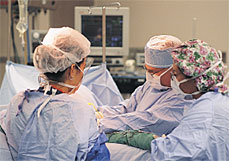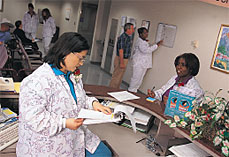
|
Dr. Howard N. Langstein,
assistant professor of plastic surgery, operates in one
of the new surgical suites in the Albert B. and Margaret
M. Alkek Hospital.
|
|
 ore
than 10,000 surgeries, totaling 37,417 surgical hours, were performed
at M. D. Anderson last year. Along with chemotherapy and radiation
therapy, surgery remains one of the key treatment options for cancer
patients. ore
than 10,000 surgeries, totaling 37,417 surgical hours, were performed
at M. D. Anderson last year. Along with chemotherapy and radiation
therapy, surgery remains one of the key treatment options for cancer
patients.
 Innovative
surgical procedures — including tumor reduction surgery, radiofrequency
ablation, stereotactic biopsies, lymph node mapping, functional
mapping aiding in the resection of brain tumors, and sacral, breast
and facial reconstruction surgery — are now performed in the
new operating rooms of the Albert B. and Margaret M. Alkek Hospital. Innovative
surgical procedures — including tumor reduction surgery, radiofrequency
ablation, stereotactic biopsies, lymph node mapping, functional
mapping aiding in the resection of brain tumors, and sacral, breast
and facial reconstruction surgery — are now performed in the
new operating rooms of the Albert B. and Margaret M. Alkek Hospital.
 The
surgical suite includes 26 operating rooms, with a sterile core
design allowing for separation of patient, equipment and supply
flow. It also offers the capability to provide radiation therapy
during surgery, with special rooms accommodating the latest in microscopic
technology. A holding/ recovery area is located nearby for monitoring
pre- and post-operative changes in patients. The
surgical suite includes 26 operating rooms, with a sterile core
design allowing for separation of patient, equipment and supply
flow. It also offers the capability to provide radiation therapy
during surgery, with special rooms accommodating the latest in microscopic
technology. A holding/ recovery area is located nearby for monitoring
pre- and post-operative changes in patients.
|


